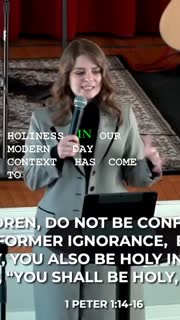Internal Struggles: Formation Through Good, Evil, and Community
Devotional
Sermon Summary
Bible Study Guide
Sermon Clips
1) "At the heart of Tolkien's writings is the fundamental truth about good and evil that exists. So in all of his writings, he really describes and depicts good and evil as not like an out there problem, but an in here one. Like a matter of the heart. Or the world is not made up of, in Tolkien's world, good people and bad people, but rather people that have messy mixture of both good and bad in their hearts. And in my opinion, one of the beauties of Rings of Power is it actually achieves this in ways that some of the other movies have not. Instead of there just being a villain and a good guy, we see the messy mixture of both occurring in all of the characters." [01:20] (47 seconds)
2) "Many Christians and non-Christians alike navigate the world believing in the essential goodness of humanity. That humans just aren't that bad. That at their core, they're really good. And this is not altogether wrong. In fact, there's a lot of truth at the heart of this. For we are all created in God's image. Whether we intentionally mean to or not, we all reflect his image in some way. Whether that's through creativity or the way that we love others. Or through our work, or our intelligence, or even through our laughter, our tears, our full breadth of emotions." [02:57] (41 seconds)
3) "And so, the question remains, kind of, what do we do with this, right? Because, let's be honest, this is really depressing. Either we bury our hands in the sand, we resign our life to evil, we don our evil capes to become the villain of our own story, we assume the worst of everyone else around us, or we choose something different. And I think Christ actually invites us into a reality in which we can learn a different way. But that way does ironically start by first acknowledging not the good of humanity, but also the depravity or the bad stuff that exists in here. For we can only change or move gradually towards the good, the perfection of Christ, if we first acknowledge that which needs to be changed." [06:26] (55 seconds)
4) "Contrary to popular modern belief, salvation, is not just simply raising a hand, or saying a prayer, or a get out of jail free card. It's a very long and slow process of forming our human self into Christ himself. And this is what Peter instructs the individuals, his audience, to do once they have received salvation. He instructs them to work that salvation out through formation. And he says this formation comes through four things. First one is future living. The second is wholehearted holiness. The third is a father. And the last one is one another." [08:02] (45 seconds)
5) "Peter here is actually warning his audience not to be distracted by the world around them, its stressors, its temptations, and preoccupation with material things, but rather to concern their minds with the world to come. To take the cover or the veil of worldly things off of their mind. Scott McKnight says it this way, live for the future. If we are being saved to something, Jesus's resurrection of us and the world, then focus not on what you're being saved from, but what you are being saved to. Another way of saying it. This future type of living, this future living really is the backbone for formation." [09:32] (52 seconds)
6) "Holiness in our modern day context has come to mean something not entirely helpful when it comes to the biblical text. Many associate holiness with purity, perfection, haughtiness, and this is kind of where we get that phrase holier than thou. But that's not the meaning or the intended purpose of the word holy in the biblical text. The word holy actually is the word hagios. And its root meaning in the English is the word different. So this is why the temple in the scriptures is called holy because it's a different type of building or it's different than the other buildings around it. This is why the Sabbath day is called holy in the scriptures because it's a different kind of day. It's different than the other days around it." [13:03] (49 seconds)
7) "Peter says that salvation is more than just a prayer being prayed or a decision being made, but it's the slow work of formation. And that formation, is accomplished through that future living wholehearted holiness of Father and through the people sitting in this room, one another. For those who are following along, you're like, wait a second, you forgot six verses. No, I didn't. I'm here. We're still doing it. So picking up back in verse 23, Peter writes this. Since you have been born again, not of perishable seed, but of imperishable through the living and abiding word of God for all flesh is like grass, and its glory like the flower of grass, and the grass wither and the flowers fail, but the word of God remains forever." [25:17] (50 seconds)
8) "Dallas Willard in his book, Renovation of the Heart, talks about the process of spiritual formation consists of what we call vision, means, and initiative. As a church, we can provide you with the vision. We can preach sermons. We can open up the scriptures. We can sing songs together. We can cast a vision for a life with Jesus. As a church, we can provide the means. We can give you a spiritual practice every single week. We can surround you with people cheering you on, holding you accountable. We can give you resources and tools to help you live those things out. But here is what we cannot do. We cannot give you initiative. We cannot give you desire. We cannot give you the craving. The only person who can do that is you." [30:01] (49 seconds)
Ask a question about this sermon
2) "Many Christians and non-Christians alike navigate the world believing in the essential goodness of humanity. That humans just aren't that bad. That at their core, they're really good. And this is not altogether wrong. In fact, there's a lot of truth at the heart of this. For we are all created in God's image. Whether we intentionally mean to or not, we all reflect his image in some way. Whether that's through creativity or the way that we love others. Or through our work, or our intelligence, or even through our laughter, our tears, our full breadth of emotions." [02:57] (41 seconds)
3) "And so, the question remains, kind of, what do we do with this, right? Because, let's be honest, this is really depressing. Either we bury our hands in the sand, we resign our life to evil, we don our evil capes to become the villain of our own story, we assume the worst of everyone else around us, or we choose something different. And I think Christ actually invites us into a reality in which we can learn a different way. But that way does ironically start by first acknowledging not the good of humanity, but also the depravity or the bad stuff that exists in here. For we can only change or move gradually towards the good, the perfection of Christ, if we first acknowledge that which needs to be changed." [06:26] (55 seconds)
4) "Contrary to popular modern belief, salvation, is not just simply raising a hand, or saying a prayer, or a get out of jail free card. It's a very long and slow process of forming our human self into Christ himself. And this is what Peter instructs the individuals, his audience, to do once they have received salvation. He instructs them to work that salvation out through formation. And he says this formation comes through four things. First one is future living. The second is wholehearted holiness. The third is a father. And the last one is one another." [08:02] (45 seconds)
5) "Peter here is actually warning his audience not to be distracted by the world around them, its stressors, its temptations, and preoccupation with material things, but rather to concern their minds with the world to come. To take the cover or the veil of worldly things off of their mind. Scott McKnight says it this way, live for the future. If we are being saved to something, Jesus's resurrection of us and the world, then focus not on what you're being saved from, but what you are being saved to. Another way of saying it. This future type of living, this future living really is the backbone for formation." [09:32] (52 seconds)
6) "Holiness in our modern day context has come to mean something not entirely helpful when it comes to the biblical text. Many associate holiness with purity, perfection, haughtiness, and this is kind of where we get that phrase holier than thou. But that's not the meaning or the intended purpose of the word holy in the biblical text. The word holy actually is the word hagios. And its root meaning in the English is the word different. So this is why the temple in the scriptures is called holy because it's a different type of building or it's different than the other buildings around it. This is why the Sabbath day is called holy in the scriptures because it's a different kind of day. It's different than the other days around it." [13:03] (49 seconds)
7) "Peter says that salvation is more than just a prayer being prayed or a decision being made, but it's the slow work of formation. And that formation, is accomplished through that future living wholehearted holiness of Father and through the people sitting in this room, one another. For those who are following along, you're like, wait a second, you forgot six verses. No, I didn't. I'm here. We're still doing it. So picking up back in verse 23, Peter writes this. Since you have been born again, not of perishable seed, but of imperishable through the living and abiding word of God for all flesh is like grass, and its glory like the flower of grass, and the grass wither and the flowers fail, but the word of God remains forever." [25:17] (50 seconds)
8) "Dallas Willard in his book, Renovation of the Heart, talks about the process of spiritual formation consists of what we call vision, means, and initiative. As a church, we can provide you with the vision. We can preach sermons. We can open up the scriptures. We can sing songs together. We can cast a vision for a life with Jesus. As a church, we can provide the means. We can give you a spiritual practice every single week. We can surround you with people cheering you on, holding you accountable. We can give you resources and tools to help you live those things out. But here is what we cannot do. We cannot give you initiative. We cannot give you desire. We cannot give you the craving. The only person who can do that is you." [30:01] (49 seconds)








